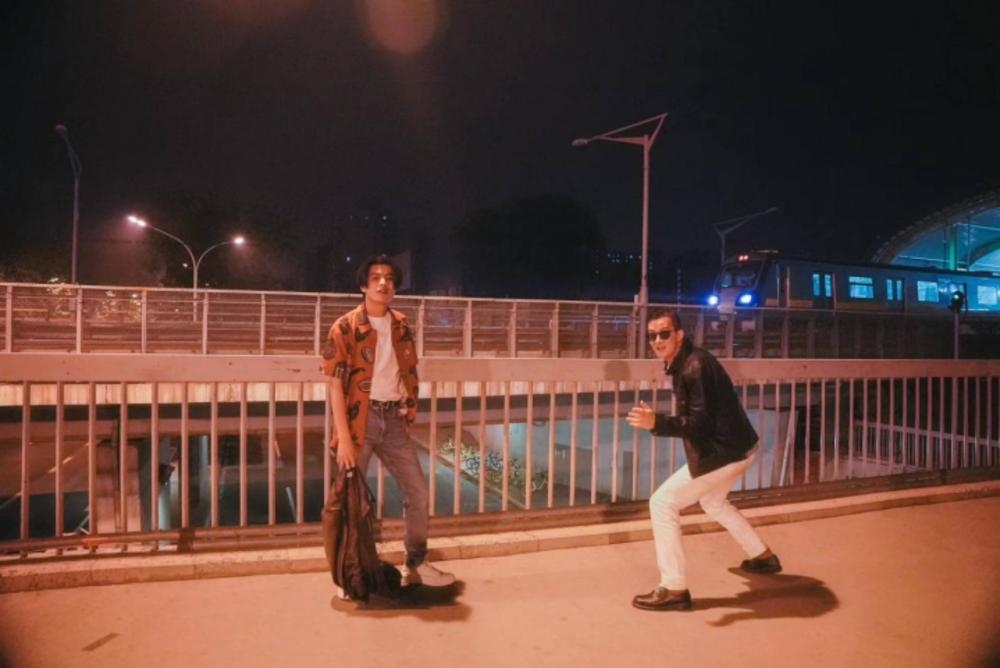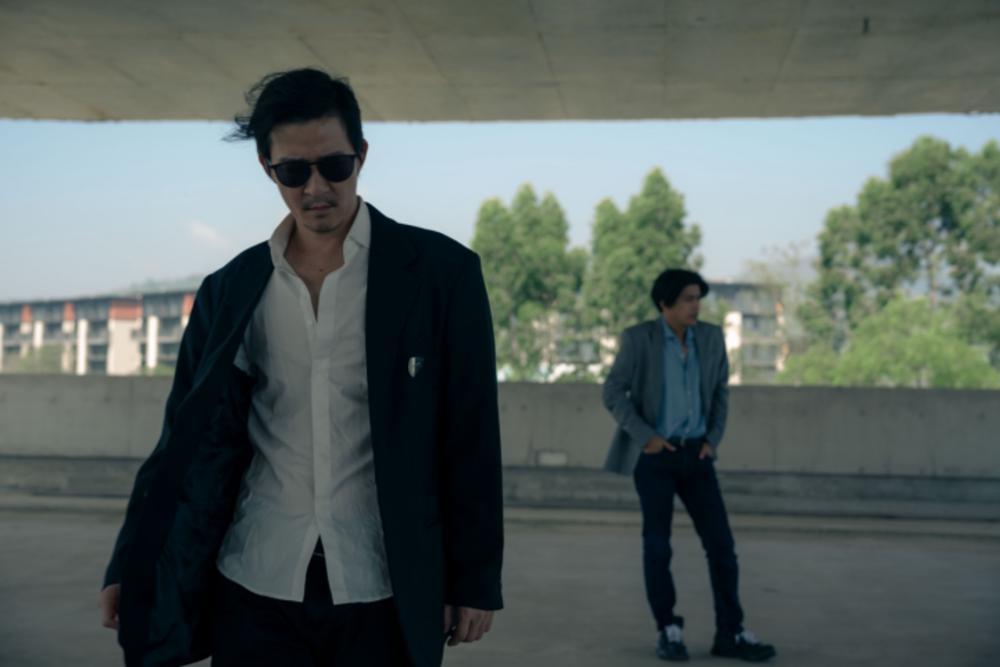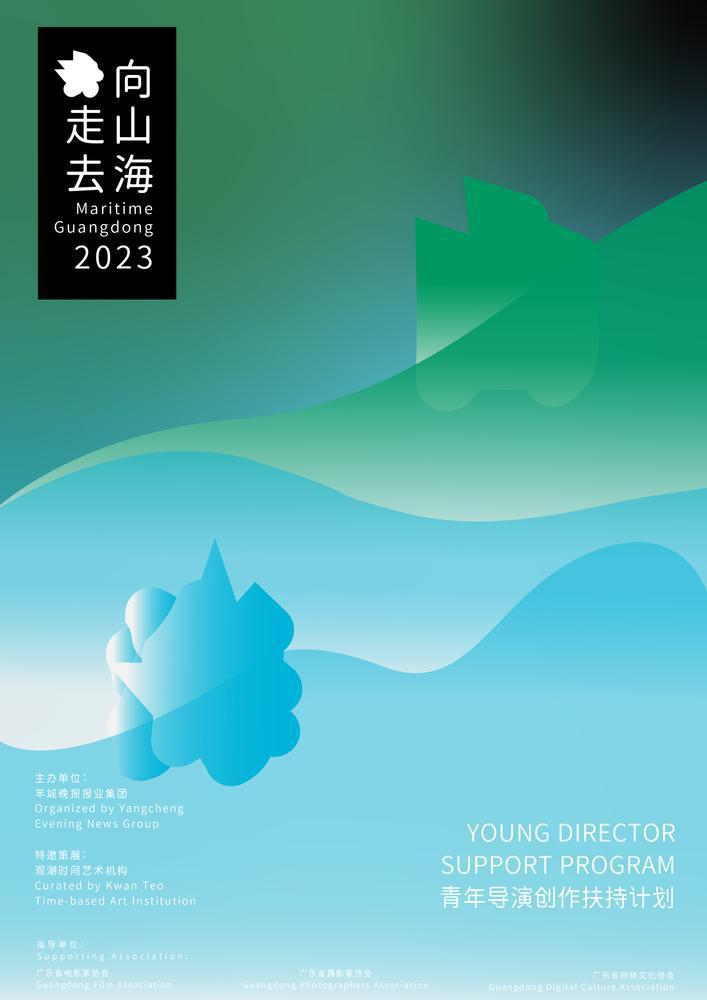文 | 羊城晚报记者 胡广欣
The 2023 Maritime Guangdong Young Director Support Program organized by the Yangcheng Evening News Group, is still in full swing. Today, the organizing committee officially announced that the renowned band Wutiaoren from Shanwei, Guangdong, is invited as the promoter of this year's Maritime Guangdong Program.
Wutiaoren band is arguably the most well-known film enthusiast in the music circle. They can hold passionate discussions about these filmmakers from Hou Hsiao-hsien to Wong Kar-wai, from Kusturica to Kore-eda Hirokazu. The film lists they compile not only circulate among their music and film fans but also attract attention from the whole circle. In recent years, the band members, Renke and Maotao have starred in several film and television works, and have successively transformed from avid film enthusiasts to professionals in the film industry, from musicians to actors.

Moreover, the Maritime Guangdong Program aligns perfectly with Wutiaoren's creative interests. Many of their songs are a good blend of Chinese style and global vision. Such as "Shiqing," depicts the dreams of working-class individuals who yearn to "go to New York, Paris, Europe to watch plays, and go fishing in Australia." In "Canton Express," they portray Guangzhou as a city where Somali men and Angolan women wander. Their lyrics in "Globe" narrate a dream of embarking on a global journey with the belief that "the Earth is flat." This year's Maritime Guangdong Program aims to support the creation of short films with a focus on overseas Chinese stories, highlighting the interplay between hometown and the world. It strives to explore the international aspects of Lingnan culture from the perspective of young filmmakers.
Three years ago, Wutiaoren left a lasting impression on the national audience with their use of the Haifeng dialect, flip-flops and "plastic" Mandarin in the TV show " The Big Band 2." While the outside world tends to emphasize their regional identity, they have long surpassed those boundaries. As they gradually venture into the broader world, the scope of Wutiaoren's works has become even more diverse. Their experiences are bound to provide valuable inspiration for the participants of the Maritime Guangdong Program this year.
【Dialogue】
Yangcheng Evening News: “Renke and Maotao, we know both of you are movie enthusiasts, so do you still remember the first movie that deeply touched you?”
Maotao: It was Hou Hsiao-hsien's "The Time to Live and The Time to Die." The movie was fascinating, and some of the scenes and dialects depicted were very similar to our hometown. The protagonist, Ah Hsiao Gu, is Hakka, but he also mixes the dialect of Southern Min when speaking, which is quite touching. Later, in our song "Childhood Memories" from "Xiancheng Ji," we paid homage to Hou Hsiao-hsien.
Renke: When I hadn't even started elementary school, I watched "My Beloved." Everyone in the cinema was crying, and I cried along with them. As I grew up, I was deeply moved by films like Tony Gatlif's "Gypsy Trilogy" ("Latcho Drom," "Swing," "Exiles"), and Kusturica's "Time of the Gypsies."
Yangcheng Evening News: When watching movies, what aspect do you pay the most attention to? Is it the style, genre, emotions, or the soundtrack?
Maotao: I believe they are interconnected. Film is a comprehensive art form, and skilled directors can handle all elements well. Take Akira Kurosawa's "Seven Samurai" for example, a three-hour movie that can still grip your heart. Kurosawa is truly a talented storyteller. I also love film soundtracks, like the ones composed by Ennio Morricone. When the music plays, the corresponding movie scenes immediately come to mind.
Yangcheng Evening News: At the recent Cannes Film Festival, Aki Kaurismäki's new film "The Withered Leaf" won the Jury Prize. I know Renke is a big fan of this director.
Renke: Yes, I'm really looking forward to seeing this new film. The work that left the deepest impression on me must be "The Man Without a Past." I've watched it three or four times. He presents a different kind of reality in his films, in a way that people may not speak in real life but feels authentic within his movies. And he has a unique sense of humor.

Yangcheng Evening News: In recent years, you have had more opportunities to participate in film creation and shooting. After getting a closer look at the film industry, what new understanding and feelings do you have?
Maotao: Acting is addictive! When you become an actor, you merge with the character. I try my best to bring the character to life by doing a lot of preparation beforehand. Filming can be tiring, shooting continuously for many days and waking up early. But as soon as the camera starts rolling, I become energized.
Renke: As an audience member, you can only experience a portion of the joy while watching a film because it's already assembled. But making a film is different. It's like we're editing something, piecing it together into a story, and the entire process is incredibly enjoyable. One second you're in the rest area, and the next second you're filming a scene—time is disrupted.

Yangcheng Evening News: Have you ever imagined your first directorial work?
Maotao: Not at the moment. I currently enjoy being an actor. I feel like Renke has more of a director's heart.
Renke: I often contemplate the idea of making films and have come up with many storylines. But some I feel aren't worth shooting, and some I've mentally gone through once and wouldn't shoot again. So it's challenging for me to answer that question. Perhaps thinking too much might hinder the process.
Yangcheng Evening News: The Maritime Guangdong Program aims to find young filmmakers with unique insights into Cantonese culture and the cultural heritage of the Greater Bay Area. How can young creators from Guangdong discover interesting and meaningful subjects from their familiar surroundings?
Renke: First and foremost, it's about sincerity and authenticity: they can start by experiencing life. Films are not obligated to replicate reality, but they constitute a form of truth. Secondly, they need to have their own aesthetics: young directors should bring forth their own energy and distill a certain emotion or aesthetic. While the story is important as the foundation of a film, for young directors, even if they construct a castle in the air, as long as it can hold together, I think it's great. Films need diversity and the personal touch of emotions. Lingnan culture can be likened to a vast ocean, and as the intrepid individual plunges into its depths, they must immerse themselves in the scorching heat of sun-kissed shores, embrace the icy chill of the seawater, and even savor the essence of the sea upon their lips. Only then can they distill these multifaceted sensations into their filmmaking, creating something truly extraordinary and distinctive.
Maotao: I'll give young creators a lyric from the song "The Ideal of the World " by Wutiaoren, say "Don't bother with it, don't bother with it, in the end, you still have to rely on yourself." Gradually, you will find things that you consider cool and impressive. Individuality is the most important.
Yangcheng Evening News: Say a word of encouragement to the young directors participating in the Maritime Guangdong program.
Maotao: It's not that complicated. If you have good ideas, act on them promptly, go shoot, go do it.
Renke: There are three kinds of reality: dreams, daily life, and films. The reality of films awaits your realization.
《五条人乐队担任2023“山海计划”发起人》
由羊城晚报报业集团主办的2023“向山海走去”青年导演创作扶持计划(以下简称“山海计划”)仍在火热进行中。今日,活动组委会正式宣布,来自广东汕尾的著名乐队五条人出任本届“山海计划”发起人。
五条人大概是音乐圈里最知名的电影爱好者。从侯孝贤到王家卫,从库斯图里卡到考里斯马基,他们都能侃侃而谈。他们列出的电影片单不仅在歌迷和影迷中间流传,也吸引了业界的注意。这几年,仁科和阿茂陆续参演了好些影视作品,更是从资深影迷进阶成影视工作者,从音乐人变成演员。
而在创作关怀上,“山海计划”与五条人也不谋而合。五条人的歌曲充满了“本土与世界”之间的强烈张力——《世情》里的打工仔,做着“去纽约,去巴黎,去欧洲看戏,去澳洲钓鱼”的美梦;《Canton Express》里的广州,游走着索马里男子和安哥拉妇女;《地球仪》的歌词,讲述一个“地球是平的”的环球旅行美梦。本届“山海计划”扶持以华侨华人故事为主题的短片创作,同样关注家乡与世界的关联,试图从青年电影人的视角发掘岭南文化的国际面向。
三年前的《乐队的夏天2》,五条人以海丰方言歌曲、人字拖和“塑料”普通话等给全国观众留下深刻印象。外界总会放大五条人的地域性,但他们早已走得越来越远。在一步步走向广阔世界的过程里,五条人作品的面貌也变得更加丰富。他们的经历,会给此次“山海计划”的参赛者带来怎样的启发?
羊城晚报:仁科和阿茂都是电影迷,还记得第一部打动你的电影是什么吗?
阿茂:侯孝贤的《童年往事》。电影太有意思了,里面出现的一些场景和方言,都跟我们老家很像。电影的主人公阿孝咕是客家人,但他讲话的时候也会夹杂闽南语,乡音令人动容。后来我们在《县城记》里有一首歌叫《童年往事》,也有点向侯孝贤致敬的意思。
仁科:还没读小学的时候看了《妈妈再爱我一次》。当时整个电影院的人都在哭,我也跟着他们哭。长大后看的法国导演托尼·加列夫的“吉普赛三部曲”(《只爱陌生人》《摇摆吉普赛》《被放逐者》)、库斯图里卡的《流浪者之歌》等等,都很感动我。
羊城晚报:看电影的时候,最关注电影的什么方面?比如说,是风格、题材、情感,还是配乐?
阿茂:我觉得是分不开的。电影是综合的艺术,厉害的导演往往可以把所有东西都拿捏得很好。比如黑泽明的《七武士》,三个多小时的电影,仍然能紧紧抓住你的心,黑泽明真是个特别会讲故事的导演。我也很喜欢电影配乐,比如莫里康内做的很多配乐,音乐出来,脑中就能浮现出对应的电影画面。
羊城晚报:在刚刚过去的戛纳电影节上,阿基·考里斯马基的新作《枯叶》刚刚拿到了评审团大奖。我知道仁科很喜欢这位导演。
仁科:是的,我很期待看到这部新电影。我对他印象最深的作品一定是《没有过去的男人》,看了三四遍。他以自己的方式,在电影里呈现出另一种真实。现实中的人可能不会这样说话,但在他的电影里是成立的。而且他有一种独特的幽默。
羊城晚报:近几年你们有了更多机会参与到电影的创作和拍摄中。更近距离地观察电影业界后,你们对电影业界有什么新的认识和感受?
阿茂:演戏是会上瘾的!当演员之后,你和角色就合而为一了。我会想尽办法把角色演活,事前多做功课。拍戏其实很累,比如要连续拍很多天,又要起得很早。但一开机我就精神了。
仁科:作为观众去看电影,只能体验到其中一部分乐趣,因为那时候电影已经组装完了。但拍电影不是,就像我们在剪辑某种东西,把它拼成一个故事,整个过程特别好玩。上一秒还在休息室,下一秒就要拍某个镜头,时间是打乱的。
羊城晚报:你们想象过自己的第一部导演作品吗?
阿茂:我暂时没有,目前更享受当演员这件事。我感觉仁科更有一颗当导演的心。
仁科:我经常思考拍电影这件事,而且想了很多剧情。但有些觉得不值得去拍,有些在脑内过了一遍就不会再拍了。所以我很难回答你这个问题。有可能想得太多反而做不好,但我还是停止不了思考电影本身。我可能还需要更长期的思考。
羊城晚报:“山海计划”希望寻找对岭南文化和大湾区侨乡文化有独到见解的青年电影人才。广东的青年创作者该如何从自己熟悉的地方发掘出有意思、有意义的题材?
仁科:首先是真诚和真实:他们可从体验生活出发,电影没有还原真实的义务,但它本身就构成了真实。其次是要有自己的美学:年轻导演要把自己的能量拿出来,提炼出一种情绪,或是一种美学。故事像是电影的地基,当然很重要;但对年轻导演来说,哪怕盖一个空中楼阁,只要能够自圆其说,我觉得也很好。电影需要多样性,需要个人的emotion。岭南文化就像一片海洋,作为跳入大海的那个人,要感受到沙滩被太阳晒过的热、海水的冰冷、甚至用嘴巴去尝海的味道,才能拍出独特的东西。
阿茂:我送给青年创作者一句歌词,来自五条人的《世界的理想》。“莫去理,莫去理,最后还是要靠自己”。慢慢地,你能找到自己认为是酷的、厉害的东西,个性是最重要的。
羊城晚报:对参加此次“山海计划”的青年导演说一句鼓励的话吧。
阿茂:没那么复杂,有好的想法就赶紧行动,去拍、去做。
仁科:有三种现实:梦、日常生活还有电影。电影的现实,等着你们去实现。

出品人|杜传贵 林海利
总监制|孙爱群 孙璇 胡泉 林如敏
总策划|孙朝方
总统筹|李艳文 朱帆 蒋铮 郑华如
执行总监|吕楠芳
执行副总监|郭文瑜
国内传播执行|李丽 邵梓恒 胡广欣 艾修煜 龚卫锋 吕航 聂青 詹淑真
国际传播执行|彭佶群 郭斌 吴方舟 刘嘉文 赵鹏 李国辉 王楠
视觉设计|王云涛 胡斌斌 陈静 季艺
品牌运营|张健 李文亮 张志威
技术支持|江华 黄强 蔡依沙









